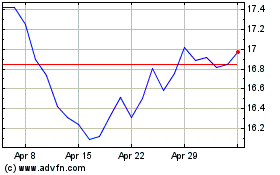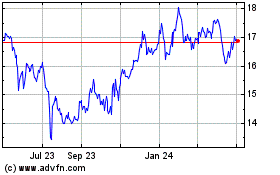AT&T Boss Met Activist -- WSJ
September 21 2019 - 3:02AM
Dow Jones News
CEO discussed strategy with hedge-fund critic
By Drew FitzGerald and Corrie Driebusch
This article is being republished as part of our daily
reproduction of WSJ.com articles that also appeared in the U.S.
print edition of The Wall Street Journal (September 21, 2019).
AT&T Inc.'s chief executive met this week with the activist
investor who is pressing the company to rethink its strategy and
sell off more assets, according to people familiar with the
matter.
AT&T boss Randall Stephenson and Jesse Cohn, the portfolio
manager at Elliott Management Corp. who challenged the telecom
veteran, met Tuesday in New York for an introductory conversation,
the people said. The hedge-fund manager discussed streamlining
operations and Elliott's other ideas, the people said.
In a letter last week, Elliott challenged AT&T's leadership,
criticized its shift into the media business and called on the
company to review units that might not fit its long-term strategy,
highlighting its DirecTV satellite division and Mexican wireless
operations.
AT&T has publicly discussed shedding smaller assets that
would help reduce debt but not alter its overall strategy. The
company is considering the sale of four regional sports networks
and a stake in a TV operator in central Europe acquired through its
Time Warner purchase. It is also marketing $500 million worth of
real estate.
The phone giant is also exploring parting with the DirecTV
business, a discussion that began before Elliott launched its
campaign, some of the people said. It has considered various
options for DirecTV, including a spinoff into a separate company
and a combination with rival Dish Network Corp., The Wall Street
Journal reported this week.
Assets sales could help the company pay down some of its roughly
$160 billion of net debt, but there are few potential buyers for
DirecTV, which has been losing millions of subscribers. It would be
hard for Dish to buy the business outright because Dish is half the
size and has little cash on hand.
A combination with Dish could be structured in another way, one
in which the new entity takes on debt and returns the proceeds back
to AT&T, analysts and people familiar with the matter say. But
there are formidable obstacles to such a deal.
AT&T finance chief John Stephens last week said combining
two satellite providers has been tried before and failed. "From a
regulatory perspective, it hasn't been successful and I don't know
that there is any change in that regulatory perspective," he said
at an investor conference.
Another complication comes from President Trump, who opposed
AT&T's purchase of Time Warner and has been openly antagonistic
toward its CNN unit. Some people close to AT&T are skeptical
they can get approval for any deal under the current
administration. The day Elliott disclosed its stake in AT&T,
Mr. Trump tweeted: "Great news that an activist investor is now
involved with AT&T."
The two nationwide satellite-TV providers tried to merge in 2001
but regulators blocked the move on antitrust grounds. The advent of
streaming services has upended the pay-TV marketplace, but
combining DirecTV and Dish would still face regulatory hurdles,
antitrust experts say. AT&T has about 23 million pay-TV
subscribers. Dish has about 12 million.
Times have changed over the past 18 years. More telephone
companies have entered cable-TV markets, while streaming services
like Netflix Inc. and Hulu arguably meet the Justice Department's
longstanding definition of a pay-TV provider. New online video
services from Comcast Corp., Apple Inc., Walt Disney Co. and
AT&T's WarnerMedia are joining the fray.
"In short, it is only a matter of time, if the time is not
already here, before the government will have to adopt a new
product market definition, " New Street Research analyst Blair
Levin, a former Federal Communications Commission official in
charge of its Obama-era national broadband plan, wrote in a note to
clients.
Antitrust experts say the closest comparison is the 2008 deal
between Sirius Satellite Radio Inc. and XM Satellite Radio Holdings
Inc. Federal regulators in that case agreed with the companies'
argument that they would still compete against a range of in-car
entertainment aside from satellites.
Merging two satellite-TV providers could still trouble
competition watchdogs looking out for rural viewers. Broadband
access in far-flung parts of the country is growing, allowing more
access to TV channels delivered over the internet. About 5% of
Americans don't have access to cable or internet TV, according to
Moody's Investors Service. A satellite-TV monopoly in those places
could hurt the deal's prospects in Washington.
To head off that problem, the two satellite providers could work
together via a joint venture to combine their back office, control
of their satellite fleets and installations, Moody's analyst Neil
Begley wrote in a note to clients. "That would potentially provide
material cost synergies while still leaving two separate
competitors intact."
Shalini Ramachandran contributed to this article.
Write to Drew FitzGerald at andrew.fitzgerald@wsj.com and Corrie
Driebusch at corrie.driebusch@wsj.com
(END) Dow Jones Newswires
September 21, 2019 02:47 ET (06:47 GMT)
Copyright (c) 2019 Dow Jones & Company, Inc.
AT&T (NYSE:T)
Historical Stock Chart
From Mar 2024 to Apr 2024

AT&T (NYSE:T)
Historical Stock Chart
From Apr 2023 to Apr 2024
